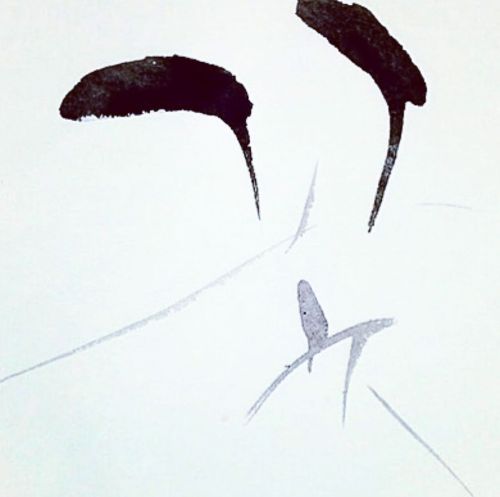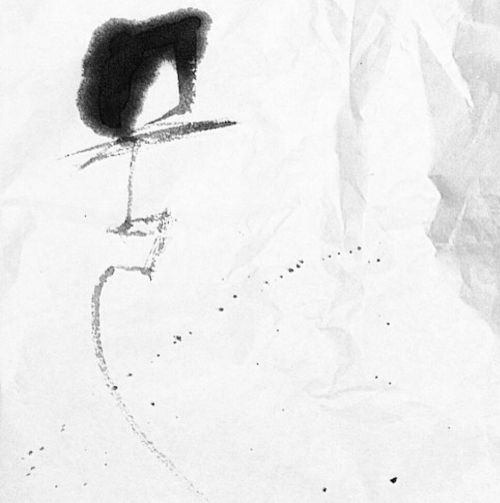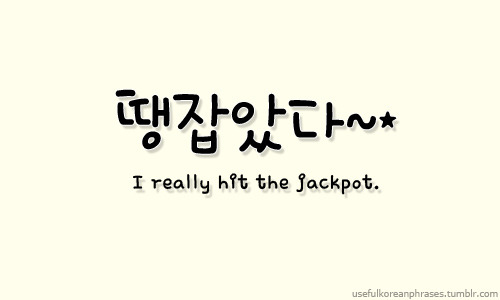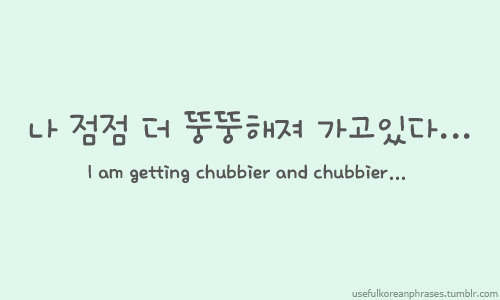#한글
안녕하세요 여러분! Hey everyone! I got another request for a K-pop breakdown, so here it is! This one was pretty tricky for me to break down, but I hope it all makes sense anyways! If you have a song you’d like to see me break down, let me know and I’ll try to fulfill it!
You can listen to this song here! I used lyricstranslate.com’s really good translations and Naver Dictionary to help me out. As usual, I linked my full-length lessons about the grammar structures mentioned if you want to learn more about them! Let’s start!
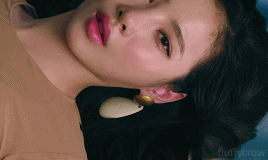
휘하고 멋지게 솟구치는 눈은 / 이별에 손짓인 듯 부서지는 / 밤으로 가득한 고요를 본다
The snow that soars up majestically with a whoosh / Sees the silence full of night / That is shattered by our goodbye as if it were a gesture
- 휘하다 -> I can’t find a related translation for this word on Naver Dictionary, but just going off the translations from lyricstranslate, it means “with a whoosh.”
- 멋지다 can mean anything from “nice” to “awesome” to “charming.”
- [adjective stem] + 게 turns that adjective into an adverb.
- -고is attached to stems to mean “and.” So 휘하고 멋지게 means “with a whoosh and majestically.”
- 솟구치다 = soar; gush; surge
- 눈 = snow
- [verb] + 는 + [noun] = [noun] that [verbs] -> This is how you describe nouns with verbs in the present tense.
- -은 is a topic particle that shows that 눈 is the topic of the sentence. More about particles here!
- 이별 = farewell; goodbye
- 에 = is a location particle meaning “to” or “in.” In this context, however, it means “by,” as in “shattered by.”
- 손짓 = hand gesture
- [noun] + 인듯 = as if it is [noun]
- 부서지다 = break; be broken; be shattered
- 밤 = night
- 가득하다 = full [of smth]
- -(으)로 in this context means “with” or “of,” as in “filled with night” or “full of night.”
- 고요 = silence
- 보다 = to see
- [verb stem] + ㄴ/는다 or [adjective stem] + 다 is known as the plain style or narrative form. This type of speech doesn’t really have a formality level. You see it a lot in books and newspapers where there’s not really a specific formality level you’re using. It can also be used with those who you would speak informally to.
돌아보는 여운이 안타깝다 / 숨을 쉰다 눈이 온다 / 인사한다 잠이 든다
The afterglow is full of regret / Breathing, snowing / Greeting, falling asleep
- 돌아보다 = to look back
- 여운 = resonance; lingering feeling; echo
- I think 돌아보는 여운 literally means “the resonance I looked back on” or something like that.
- 안타깝다 = regrettable; sad
- 숨을 쉬다 = to breathe
- 눈이 오다 = to snow (literally “snow comes”)
- 인사하다 = to greet
- 잠이 들다 = to fall asleep
- When conjugated into the plain style, the ㄹ gets dropped and replaced with -ㄴ다 because it’s irregular.
떠나간다 / 떠나간다 / 남은 것은 이제 없다
Leaving / Leaving / Now there’s nothing left
- 떠나가다 = to leave
- 남다 = to remain; to be left
- 남은 것 = what’s left; the things that remain
- 이제 = now
- 없다 = to not be there; to not exist; to not have
그대가 웃는 걸 보면서 나도 웃는다 / 발자국에 아쉬움 꾹 묻어둔 채로
As I look at you smile, I smile too / Burying my regret in my footprints
- 그대 = You -> this is a more romantic way of saying “you” that you would say to your partner.
- 웃다 = to smile; to laugh
- 웃는 걸 refers to the fact that you’re smiling. The action of you smiling is turned into a noun, and that is what the speaker is looking at.
- [verb stem] + (으)면서 means “as one [does verb]” and is used for when two actions are done simultaneously.
- 나 = I (informal)
- -도 = too
- 발자국 = footprints
- 아쉽다 = be a shame; be a pity
- 아쉬움 is the noun form of 아쉽다 courtesy of -ㅁ nominalization.
- 꾹 = firmly; completely
- 묻어두다 = hide; bury; conceal
- -ㄴ 채로 describes the state that something is in as an action is being done. In this case, the speaker is smiling with her heart buried – her heart is in the state of being buried as she is smiling.
That’s all for this breakdown – I hope it was helpful! See you in the next lesson! 다음에 또 봐요!
- My masterlist
- Joinmy Discord chat here to practice Korean with others!
- Follow me onInstagram herefor more Korean content!
- GetDrops Premium usingmy affiliate linkto expand your Korean vocab!
- Check out myKo-Fi to support this blog and my studies! Thank you for your generosity!
안녕하세요 여러분! Hey everyone! I got yet another request for a breakdown! If you have a song you’d like to see broken down, let me know! I linked my full-length lessons about the featured grammar points throughout as well in case you want to learn more about them!
I translated all these lyrics myself, but I did refer to this lyric videoandNaver Dictionary to help me out :) Let’s start!
나를 스쳐가는 그대 / 내 말을 들어줘 / 걸음을 멈추고 / 내 노랠 들어줘
You brush against me / Listen to what I have to say / Stop in your tracks / And listen to my song
- 나를 = me
- 나 is the informal way to say “I,” while -를 is an object particle. More about particles here!
- 스쳐가다 = to brush against; to pass by
- 그대 = you -> This is a poetic/romantic way to say “you” and isn’t really used in everyday spoken Korean.
- [verb stem] + 는 allows you to describe nouns with that verb. 나를 스쳐가는 그대 literally means “you who brushes against me.”
- 내 = my (informal)
- 말 = words
- 듣다 = to listen; to hear
- 듣다’s stem ends in ㄷ, so it becomes 들어줘 when conjugated.
- [verb stem] + 아/어주다 means that a verb is done forsomebody and can be used when pleading that someone do something for you. In this case, he’s commanding that you listen to him.
- Literally, this line means “listen to my words.”
- 걸음 = step(s) -> from the verb 걷다, meaning “to walk”
- 멈추다 = to stop
- -고 is a connector that means “and.” This line means “stop in your tracks and…”
- 노래 = song
축 처진 고개들과 / 비틀거리는 그림자 / 그렇게 나는 불청객이 돼 / 아무도 모르는 yeah / 노래를 부르며 yeah
Among the drooping heads / And staggering shadows / I become an uninvited guest / While I sing a song / That nobody knows
- 축 처지다 = droop; hang; sag
- 고개 = head
- Attach -들 to nouns to make them plural
- [verb stem] + ㄴ/은 allows you to describe a noun with that verb in the past tense. So 축 처진 고개들 literally means “heads that drooped.”
- 과/와is attached to nouns to mean “and” or “with.” 과 is attached to nouns ending in a consonant, while 와 is attached to those ending in a vowel.
- 비틀거리다 = stagger; stumble; falter; totter
- 그림자 = shadow(s) (it can still be implied that a noun is plural without the -들 depending on the context!
- 그렇게 = like that
- 불챙객 = uninvited guest
- 되다 = to become
- These lines were a little tricky to translate, but I think it essentially means “the drooping heads and staggering shadows, like that, I become an uninvited guest” as if he is an uninvited guest because the drooping heads and staggering shadows make him one.
- 아무도 = nobody
- 모르다 = to not know
- 아무도 모르다 sounds like a double negative – nobody doesn’t know. But in Korean, this is the correct way to say “nobody knows”! When using indefinite pronouns like 아무것도, 아무데도, (nothing, nowhere), etc., you need to use a negative verb like so.
- 부르다 -> when paired with 노래, means “to sing.”
- [verb stem] + (으)며means “while [verb]” and is used when two actions are happening at the same time.
아무도 모르는 / 노래를 부를래 / 지나가는 너의 / 마음을 붙잡을 수 있길 바라며
I’ll sing a song / That nobody knows / Hoping that I can grasp your heart / As it passes
- [verb stem] + ㄹ/을래(요) means “I will [verb]” or “I want to [verb].” It expresses a strong intention to do something.
- 지나가다 = pass; go by
- 너의 = your(informal)
- 너 means “you” (informal), and -의 is a possessive marker.
- 마음 = hear
- 붙잡다 = grasp; grab; hold
- [verb stem] + ㄹ/을 수 있다 = can [verb]
- [verb stem] + 기를 바라다 = to hope that [verb]
- Those last two lines literally mean “while hoping I can grasp your passing heart.”
That’s about it for this breakdown! Hope it was helpful :) See you in the next lesson! 화이팅!
- My masterlist
- Joinmy Discord chat here to practice Korean with others!
- Follow me onInstagram herefor more Korean content!
- GetDrops Premium usingmy affiliate link to expand your Korean vocab!
- Check out myKo-Fi to support this blog and my studies! Thank you for your generosity!
안녕하세요 여러분! Hey everyone! I have another Hanja lesson for y’all today – this one is about two possible meanings of 악! I’m planning on posting this to my Instagramtomorrow as well, so be sure to follow me there for more Korean content! I hope this is helpful, and you can let me know if you have any questions! 화이팅!
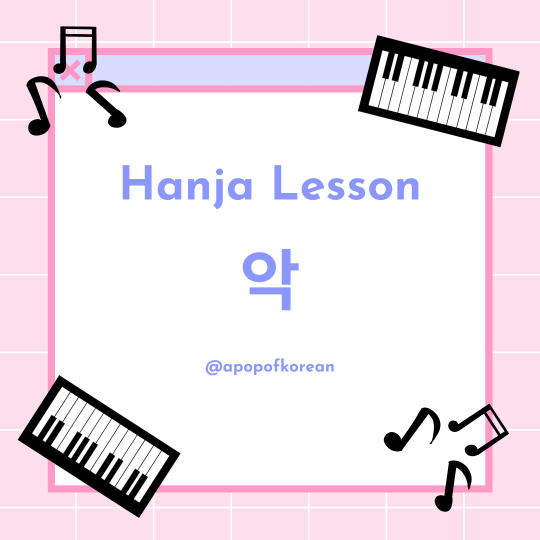
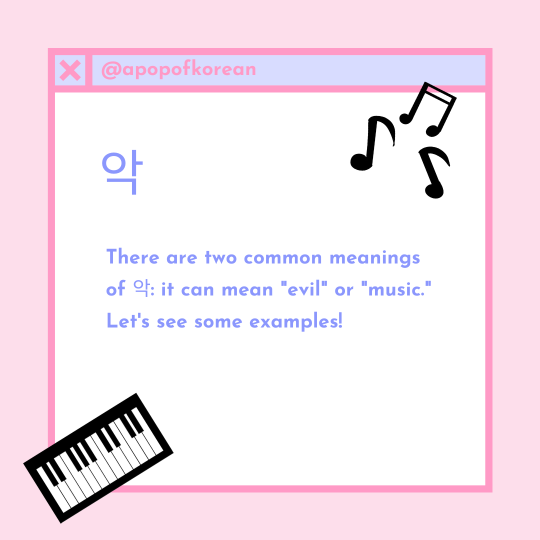
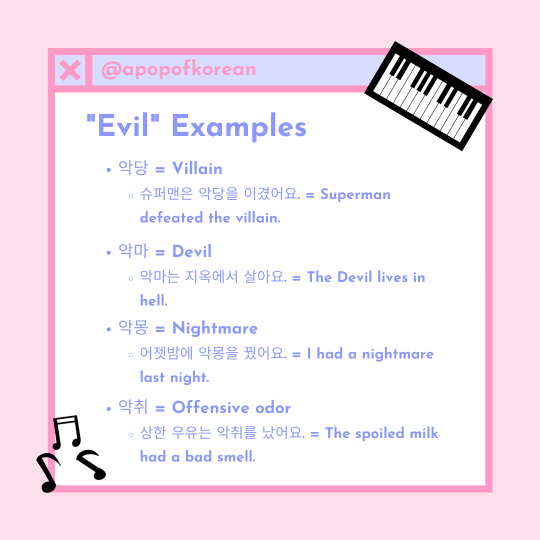
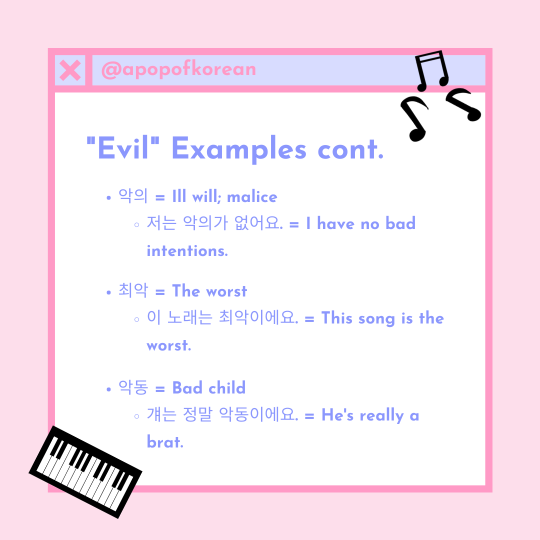


- My masterlist
- Joinmy Discord chat here to practice Korean with others!
- Follow me onInstagram herefor more Korean content!
- GetDrops Premium usingmy affiliate linkto expand your Korean vocab!
- Check out myKo-Fi to support this blog and my studies! Thank you for your generosity!
VERB PER DAY #3
하다 - to do
Past tense - 했어요
- A:어제 뭐 했어요?
- What did you do yesterday?
- B:나의 숙제를 했어요.
- I did my homework.
어제 - yesterday
뭐 - what
나의 - my
숙제 - homework
Present tense - 해요
- A:무슨 일을 해요?
- What work do you do?
- B: 저는 의사예요.
- I am a doctor.
무슨 - what; what type; what kind
일 - work
의사 - doctor
Present progressive - 하고 있어요
- A:뭐 하고 있어요?
- What are you doing?
- B:운동을 하고 있어요.
- I am exercising.
운동 - exercise (noun)
Future tense - 할 거예요
- A:너 왜 이렇게 빨라요?
- Why are you so fast?
- B:제 친구가 기다려서 내가 이거를 그냥 빨리 할 거예요.
- My friend is waiting so I’ll just do this quickly
너 - you
왜 - why
이렇게 - so; in a manner; in a way; like this
빠르다 - to be fast (빨라요 - present tense)
제 - my
친구 - friend
기다리다 - to wait
이거 - this
그냥 - just
VERB PER DAY #2
보다 - to see
Past tense - 보 + -았어요 = 봤어요
- 어제 뭐 했어요?
- What did you do yesterday?
- 친구랑 같이 영화를 봤어요.
- I watched a movie with my friend.
Present tense - 보 + -아요 = 봐요
- 요즘 뭐 해요?
- What do you do these days?
- 영화를 봐요.
- I watch movies.
Present progressive - 보 + -고 있어요 = 보고 있어요
- 지금 뭐 하고 있어요?
- What are you doing now?
- 지금 텔레비전을 보고 있어요.
- I am watching TV now.
Future tense - 보 + -ㄹ 거예요.
- 내일 뭐 할 거에요?
- What will you do tomorrow?
- 내일 공원에서 폭죽을 볼 거예요.
- I will watch fireworks tomorrow at the park.
VERB PER DAY #1
먹다 - to eat
Past tense - 먹었어요
- 저는 어제 피자를 먹었어요.
- I ate pizza yesterday.
Present tense - 먹어요
- 오후 열두 시에 점심을 먹어요.
- I eat lunch at 12 pm.
Present progressive - 먹고 있어요
- 지금 빙수를 먹고 있어요.
- I am eating bingsu now.
Future tense - 먹을 거예요
- 나중에 친구들이랑 냉면을 먹을 거예요.
- I will eat naengmyeon later with my friends.
VOCABULARY WORDS #1
The following words are words that are commonly used in a daily conversation. These are helpful and good to know especially to those who are still in a beginner level and to those who are still building up their vocabulary in Korean.
*자주 - frequently / often
*가끔 - sometimes
*거의 - almost
*계속 - continuously
*똑바로 / 바로 - straight
*좀 - please
*가장 - most
*먼저 - ahead / first
*우선 - in the first place
*매우 / 무척 / 아주 - very
*너무 - too / so
*얼마나 - how long/much/many
*정말 - really
*참 - really / very
*많이 - many
*약간 - a few / little
*전혀 - none / not at all
*잘 - well
*일찍 - early
*이따가 - later
*못 / 안 - not
*더 - more
*모두 / 다 / 전부 - all / whole
*또 / 다시 - again / once more
*따로 - separately
*주로 - mainly / usually
*간단히 - simply
*갑자기 - suddenly
*빨리 / 어서 - fast / quickly
*천천히 - slowly
*같이 - together
*벌써 - already
*곧 - soon
*새로 - newly
*금방 - soon
*방금 - just now / seconds ago
*늘 / 항상 - always
*조용히 - quietly
*열심히 - eagerly
*언제나 - whenever
*오래 - for a long time
*없이 - without
*아까 / 좀전에 - a while ago
*특히 / 특별히 - especially
*아직 - yet
*미리 - in advance
*바로 - right now
*직접 - directly
*깜빡 - with surprise
*꼭 - firmly / just
*아마도 - probably
*별로 - particularly
*그냥 - just
*서로 - with each other
Today is 한글날!
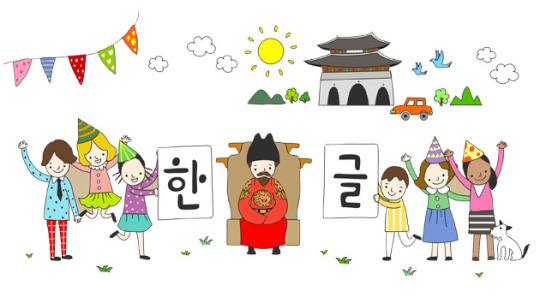
한글날 celebrates the creation of Korea’s unique alphabet by the 15th-century monarch Sejong the Great. Hangul was made with the express purpose of being so easy that one could learn it in a day and now today Korea is one of the most literate nations on earth! Which is confirmed with most people in the community and even outside knowing the very popular ”Learn-to-Read-Korean-in-15-Minutes” comic.
Even though korean has changed since the 1400′s hangul is still one of the easiest writing systems to learn, even with the confusion of the difference between ㅔ and ㅐ. To learn more about 한글 and how its developed I recommend checking out koreanwikiproject.
Heres some quick resources for learning 한글!
korean kitchen themed vocab part.2
음식 · food저녁을 만들다 · to cook diner
아침 식사 · breakfast
점심 · lunch
후식 · dessert
요리책 · cookbook
성분 · ingredient
소금 · salt
짜다 · to be salty
후추 · pepper
기름 · oil
설탕 · sugar
달다 · To be sweet
레몬 · lemon
우유 · milk
물 · water
계란 · egg
버터 · butter
중력분 · flour
바닐라 익스트랙 · vanilla extract
식용색소 · food coloring
굽다 · to bake
빵 · bread
케이크 · cake
맛보다 · to taste
맛있는 · yummy
레시피 · recipe
요리사 · cookchef
요리 · cuisine
요리하다 · To cook
맵다 · To be spicy
Christmas
사탕 지팡이 - Candy cane
크리스마스 - Christmas
꼬마 요정 - Elf
과자집 - Gingerbread house
메리 크리스마스 - Merry Christmas
겨우살이 - Mistletoe
북극 - North Pole
선물 - Present
순록 - Reindeer
산타 클로스 - Santa Claus
눈 - Snow
눈사람 - Snowman
크리스마스 양말 - Stocking
Hello
.
.
.
.
Like , share , comment and save Do not repost❌
Follow @learningkorean20
Like , share , comment and save Do not repost❌
Follow @learningkorean20
Like , share , comment and save Do not repost❌
Follow @learningkorean20
Like , share , comment and save Do not repost❌
Follow @learningkorean20
Like , share , comment and save
Follow @learningkorean20
Like , share , comment and save
Follow @learningkorean20
꽃 / 花 / flower
#calligraphy
#calligrapher
#logo
#art
#artwork
#한국어
#한글
#꽃
#韓国語
#花
#書道
#書
#筆文字
#墨
#flower
https://www.instagram.com/p/Ca_18gvJ0ar/?utm_medium=tumblr
Post link
별 /星 / star
#calligraphy
#calligraphy
#art
#artwork
#별
#한국어
#한글
#stars
#韓国語
#書道
#筆文字
#墨
#星
https://www.instagram.com/p/Ca_0yPQpVrW/?utm_medium=tumblr
Post link
물 /水 / water
#calligraphy
#calligraphy
#art
#artwork
#물
#한국어
#한글
#韓国語
#water
#水
#書道
#筆文字
https://www.instagram.com/p/Ca_0X85pQog/?utm_medium=tumblr
Post link
커피 / コーヒー / coffee
#커피
#한국어
#한글
#韓国語
#珈琲
#coffee
#calligraphy
#calligraphy
#art
#logo
#書道
#書
#筆文字
#墨
#コーヒー
https://www.instagram.com/p/Ca_zO69J7cB/?utm_medium=tumblr
Post link
비 / 雨 / rain
#비
#한국어
#한글
#韓国語
#rain
#雨
#calligraphy
#art
#logo
#書道
#墨
https://www.instagram.com/p/Ca_q-74pEcM/?utm_medium=tumblr
Post link
Hi, sorry for the month-long hiatus! This is a really busy time.
Here’s a small grammar post about the advanced grammar point ~건마는 in the hopes you forgive me:
나 점점 더 뚱뚱해져 가고있다; na-jeom-jeom-do-ddoong-ddoong-hae-jwo-gah-goh-eet-da; I am getting chubbier and chubbier
Post link

